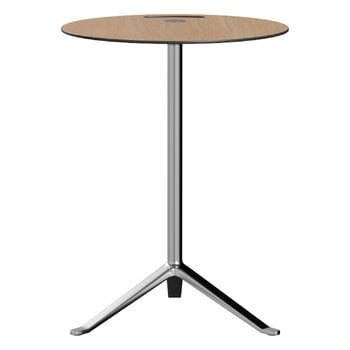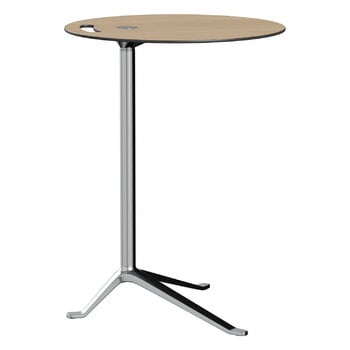Fritz Hansen's Little Friend KS12 side table is the epitome of versatility and dependability. True to its name, the table is your go-to companion for various needs. Whether you need a computer desk or a display platform for plants in your home or office, the Little Friend adapts effortlessly, and the lightweight design makes it easy to move from one room to another if needed. Designed by Danish Kasperl Stalton, the table features a laminate oak veneer top and a sturdy polished aluminium base that combined together create a simple yet sophisticated look.
Little Friend KS12 side table, mirror polished aluminum - oak
Fritz Hansen
Description
Fritz Hansen's Little Friend KS12 side table is the epitome of versatility and dependability. True to its name, the table is your go-to companion for various needs. Whether you need a computer desk or a display platform for plants in your home or office, the Little Friend adapts effortlessly, and the lightweight design makes it easy to move from one room to another if needed. Designed by Danish Kasperl Stalton, the table features a laminate oak veneer top and a sturdy polished aluminium base that combined together create a simple yet sophisticated look.
Product details (8)
- Colour
- Oak, polished aluminum
- Height
- 60.5 cm
- Diameter
- 45 cm
- Measurement details
- Leg width 41.5 cm and depth 34.5 cm
- Table top material
- Laminate oak veneer
- Frame material
- Steel, aluminium
- Weight
- 5 kg
- Care instructions
- Wipe with a damp cloth wrung in warm water and mild detergents if needed.
- Product ID
Designer
Kasper Salto (b. 1967) and Thomas Sigsgaard (b. 1966) combined their design forces in 2003 as they founded their design office Salto & Sisgaard. Together they have worked mainly with light projects.
View all productsReviews (0)
Sustainability
The Product Sustainability Framework, our criteria of sustainable design, helps you find the most sustainable products in our selection. Read below which sustainability criteria this product has met.
Working conditions & labour 9/9
-
Equal opportunities for all employees
-
Commitment to UN Global Compact, fair compensation for all employees
-
Corporate responsibility requirements defined and communicated for suppliers
-
Systematic work for improved inclusion and well-being in the workplace
-
Transparent supply chain
-
Suppliers' compliance to a code of conduct ensured
-
Direct suppliers audited and certified
-
Compliance to the UN Guiding Principles on Business and Human Rights ensured in the supply chain
-
Support for community involvement in the supply chain
Eco-friendly production 6/9
-
Fair and resource-wise water-use in production
-
No incineration or landfilling of returned items
-
No use of endangered species as materials
-
No direct environmental emissions or waste (excl. GHGs) from production
-
Material-efficient and ecological packaging
-
No potentially harmful chemicals used in own production
-
The sustainability of direct suppliers' production is addressed and monitored
-
Production and material sourcing that respect biodiversity, animal rights, and natural ecosystems
-
Positive impact on nature’s well-being through operations that regenerate natural ecosystems
Climate impact 5/8
-
Company's direct greenhouse gas emissions identified and commitment to reduction
-
Product's carbon impact identified and commitment to reduction
-
Guidance on energy- and eco-efficient use of the product
-
Contribution to climate initiatives beyond the brand’s direct operations
-
Carbon footprint of the product calculated and goals set to reduce it
-
Low-carbon or compensated transportation
-
100 % renewable energy in own production and operations
-
Carbon neutral or carbon negative product
Sustainable materials 4/6
-
Sustainable and long-lasting material choices
-
No harmful or hazardous substances
-
Responsible raw material sourcing and production
-
Ecological materials: natural, biodegradable, recyclable or recycled contents
-
Materials suited for circularity: monomaterials, recyclable finishings, renewable or recycled contents etc.
-
Outstanding materials in terms of innovativeness, responsibility, sustainability and circularity: local production or sourcing, 100 % recycled content, C2C-certification etc.
Circular design 3/5
-
High aesthetic quality promoting long-term use of the product
-
Technically durable product design and material choices
-
Design for enduring life-long quality
-
Design and support for product maintenance, repair and upgradability
-
Innovative circular design solutions: circular service system, resale platform, remanufacturing, collection of used products, etc.









